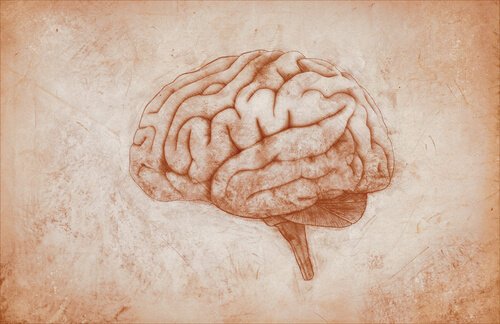The Resilient Personality: Good Morning World, I'm Still Here!

There are people who have the ability to overcome great setbacks or very painful and emotional events. We could say that they have a very resilient personality. To develop a resilient personality, you need to have a positive attitude and never stop trying.
The loss of a loved one, physical or psychological abuse, natural catastrophes, or failure are circumstances that put us to the test. You can develop the ability to be strong in difficult situations and swim against the current. This means you can have a resilient personality.
There are two types of resilient personalities. First, there’s the ability to protect one’s identity under the intense pressures of destructive conditions. On the other hand, there’s the ability to maintain a positive attitude during painful situations. It’s a dynamic process of adapting to adverse environments and traumatic experiences.
Suffering and the brain
Psychological suffering modifies the brain. Being in a constant state of alert generates cortisol levels that are unnecessary under normal circumstances. For example, our warning system needs cortisol to prepare our body in case of an emergency. But when our cortisol levels are excessive and constant, it hinders growth. Furthermore, it can also affect our immune responses and attention span.
Testosterone plays a crucial role in stressful situations. Specifically, hostile situations reduce testosterone levels considerably. This, in turn, reduces an individual’s assertive abilities. This leads to a lack of attention. Also, this kills the individual’s creativity and makes them repeat patterns of what they’ve already lived.

Is the resilient personality a categorization?
In cases of post-traumatic stress, a gradual distinction can be made between a non-resilient and resilient personality. As a consequence, there are many degrees between both extremes.
For example, people who don’t have a resilient personality reactivate memories of traumatic experiences more intensely and more frequently than those with a resilient personality. They do this compulsively and in the form of intrusive thoughts. These memories activate areas of the brain such as the locus coeruleus, amygdala, hippocampus, the neocortex.
Thus, a resilient personality seems to be the result of several processes that counteract the effects of hostile situations. Dehydroepiandrosterone (DHEA) plays an important role in this. Namely, it’s responsible for reducing cholesterol activity and also inhibiting excessive glucocorticoids and glutamate.
Thus, it prevents cardiac infarctions and ischemic strokes. Experts have observed that, statistically, subjects with a greater intellectual capacity and cognitive activity have higher resilience levels. In particular, they seem to be able to handle and process traumas more easily.
Empathy, self-knowledge, a sense of humor, a positive approach to situations, and focusing on the present are several of the abilities that resilient people have. Likewise, they’re flexible people who seek a meaningful purpose in their lives. Furthermore, they have good social skills and know how to cope with frustration and uncertainty.
People can build resilience
Our emotions and the way we handle situations aren’t as externally conditioned as they are internally. Thus, the key is always interpretation. Building resilience means understanding that negative emotions block us and positive emotions push us to change.
Specifically, it’s developing the ability to have positive responses in adverse situations. In many cases, we don’t have the power to change our circumstances. However, we can develop skills that enable responses that help us cope with our difficulties.
There are many things we can do to achieve this. We can rewrite our story, help others, reduce our stress levels, and be willing to reorganize our beliefs and goals. Changing our paradigms will allow us to see the world and ourselves differently.

Similarly, we should begin to consider conflicts as growth opportunities. Remembering how we overcame obstacles in the past will also help us build resilience.
To be strong, we need a great deal of perseverance and confidence. As we learn from the past and allow ourselves to experience strong emotions, we learn to manage them intelligently.
There are people who have the ability to overcome great setbacks or very painful and emotional events. We could say that they have a very resilient personality. To develop a resilient personality, you need to have a positive attitude and never stop trying.
The loss of a loved one, physical or psychological abuse, natural catastrophes, or failure are circumstances that put us to the test. You can develop the ability to be strong in difficult situations and swim against the current. This means you can have a resilient personality.
There are two types of resilient personalities. First, there’s the ability to protect one’s identity under the intense pressures of destructive conditions. On the other hand, there’s the ability to maintain a positive attitude during painful situations. It’s a dynamic process of adapting to adverse environments and traumatic experiences.
Suffering and the brain
Psychological suffering modifies the brain. Being in a constant state of alert generates cortisol levels that are unnecessary under normal circumstances. For example, our warning system needs cortisol to prepare our body in case of an emergency. But when our cortisol levels are excessive and constant, it hinders growth. Furthermore, it can also affect our immune responses and attention span.
Testosterone plays a crucial role in stressful situations. Specifically, hostile situations reduce testosterone levels considerably. This, in turn, reduces an individual’s assertive abilities. This leads to a lack of attention. Also, this kills the individual’s creativity and makes them repeat patterns of what they’ve already lived.

Is the resilient personality a categorization?
In cases of post-traumatic stress, a gradual distinction can be made between a non-resilient and resilient personality. As a consequence, there are many degrees between both extremes.
For example, people who don’t have a resilient personality reactivate memories of traumatic experiences more intensely and more frequently than those with a resilient personality. They do this compulsively and in the form of intrusive thoughts. These memories activate areas of the brain such as the locus coeruleus, amygdala, hippocampus, the neocortex.
Thus, a resilient personality seems to be the result of several processes that counteract the effects of hostile situations. Dehydroepiandrosterone (DHEA) plays an important role in this. Namely, it’s responsible for reducing cholesterol activity and also inhibiting excessive glucocorticoids and glutamate.
Thus, it prevents cardiac infarctions and ischemic strokes. Experts have observed that, statistically, subjects with a greater intellectual capacity and cognitive activity have higher resilience levels. In particular, they seem to be able to handle and process traumas more easily.
Empathy, self-knowledge, a sense of humor, a positive approach to situations, and focusing on the present are several of the abilities that resilient people have. Likewise, they’re flexible people who seek a meaningful purpose in their lives. Furthermore, they have good social skills and know how to cope with frustration and uncertainty.
People can build resilience
Our emotions and the way we handle situations aren’t as externally conditioned as they are internally. Thus, the key is always interpretation. Building resilience means understanding that negative emotions block us and positive emotions push us to change.
Specifically, it’s developing the ability to have positive responses in adverse situations. In many cases, we don’t have the power to change our circumstances. However, we can develop skills that enable responses that help us cope with our difficulties.
There are many things we can do to achieve this. We can rewrite our story, help others, reduce our stress levels, and be willing to reorganize our beliefs and goals. Changing our paradigms will allow us to see the world and ourselves differently.

Similarly, we should begin to consider conflicts as growth opportunities. Remembering how we overcame obstacles in the past will also help us build resilience.
To be strong, we need a great deal of perseverance and confidence. As we learn from the past and allow ourselves to experience strong emotions, we learn to manage them intelligently.
This text is provided for informational purposes only and does not replace consultation with a professional. If in doubt, consult your specialist.







